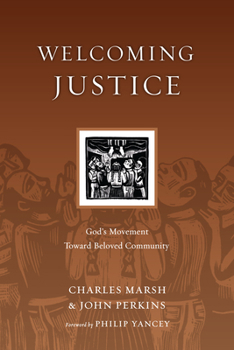Welcoming Justice: God's Movement Toward Beloved Community
Select Format
Select Condition 
Book Overview
It was not that long ago that African Americans and other minorities were excluded from many spheres of American public life. We have seen remarkable progress in recent decades toward Martin Luther King Jr.'s dream of beloved community. But this is not only because of the activism and sacrifice of a certain generation of civil rights leaders. It happened because God was on the move.Historian and theologian Charles Marsh partners with veteran activist John Perkins to chronicle God's vision for more equitable and just world. They show how the civil rights movement was one important episode in God's larger movement throughout human history of pursuing justice and beloved community. Perkins reflects on his long ministry and identifies key themes and lessons he has learned, and Marsh highlights the legacy of Perkins's work in American society. Together they show how abandoned places are being restored, divisions are being reconciled, and what individuals and communities are now doing to welcome peace and justice. The God Movement continues yet today. Come, discover your part in the beloved community. There is unfinished work still to do.
Format:Paperback
Language:English
ISBN:0830834532
ISBN13:9780830834532
Release Date:September 2009
Publisher:IVP Books
Length:139 Pages
Weight:0.50 lbs.
Dimensions:0.4" x 5.6" x 8.2"
Customer Reviews
2 ratings
A compelling, challenging and encouraging read
Published by Thriftbooks.com User , 15 years ago
Though both men have a long history in racial reconciliation -- Charles Marsh as a professor and the director of the Project on Lived Theology at the University of Virginia, and John Perkins as the founder of the Voice of Calvary in Mississippi and the Christian Community Development Association -- this book looks forward more than it looks back. Both men lament the failure of the Civil Rights Movement to hold on to its Christian roots, and both men are critical of the continuing "cultural captivity" of the evangelical church. But both men also see God continuing his work of reconciliation down to the present, and Perkins in particular, expresses optimism that many of today's youth -- high school and college students -- have a vision for God's Beloved Community and are working to make it a reality.
Embrace Reconciliation
Published by Thriftbooks.com User , 15 years ago
I have been involved with the issue of reconciliation for about 5 years now. My wife and I (and our son who was 2 years old at the time) spent 3 months on an intense residential course on Biblical Reconciliation before we moved to the States. For three months I was steeped in lecturers and books on reconciliation. The paper that I wrote for the course, The Paradox of A Divided Church Called To Be Reconcilers To The World, was published as a chapter in a book. I also edited a resource book for schools on Biblical Reconciliation. It was for these reasons that I was excited to review this book. Charles Marsh (Seminary Professor) and John Perkins (Civil Rights activist) team together to write on God's movement towards `Beloved Community.' As John Perkins writes, God is calling me to help churches see and incorporate as an essential part of discipleship. The captivity of the church to our culture has left us so divided. The church has a massive, God given role in reconciliation and it needs to embrace this call. The gospel itself is a call to reconciliation - turn back to The Father who desires to be restored in relationship with his children through his Son Jesus Christ; The Church is called to be a blessing in places of brokenness, so God sends us to the jails. God wants us to interrupt this broken system with his love. The chapters are shared between Perkins and Marsh. When you read Perkins chapters you literally hear his cry leaping from the pages - the cry for the church to get serious about true reconciliation; serious about being involved with a broken world; serious about community that is attractive, discipleship based and reconciliation focused. Christians have spent a lot of time talking about who Jesus is without paying attention to how he lived. Community based church is a key feature for the authors. A Church that simply attracts people who commute in and out is not as asset to a community. They contribute very little, if not nothing to the community (accept traffic problems on a Sunday). A Church that is made up of people from the community is an asset to the community - investing time and energy in those with whom they live with to declare God's reconciliation and to be an illustration of reconciliation to the community. Of course the two key areas that need this is racial relations and those in poverty and time is spent on these issues. John Perkins insights into the civil rights movement of the 50's and 60's are very insightful. Much has changed and much progress has been made since Martin Luther-Kings death some 40 years ago, but there is more to be done; We're not there yet, but we are living in a new time. This is a time for re-building. I pray that every Christian, young and old alike, would have the courage to give themselves fully to God's movement toward reconciliation and beloved community in society. My only difficulty with the book was that some of the chapters were a little disjointed. Sometimes I was not sure whe






